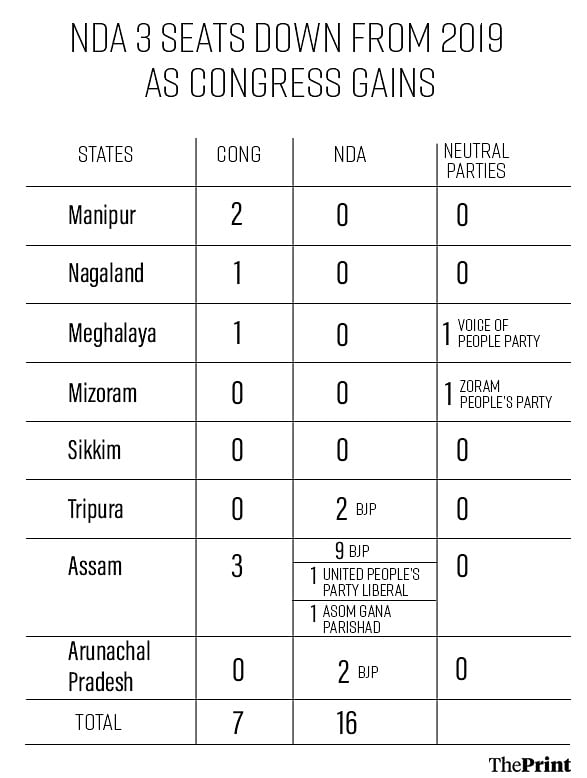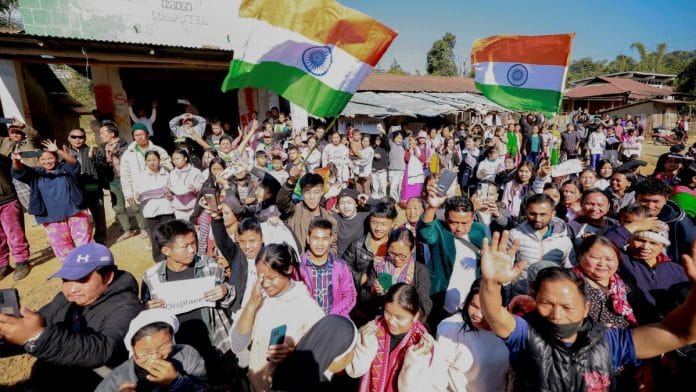Guwahati: Of the many surprises in the Lok Sabha election results is the Bharatiya Janata Party-led National Democratic Alliance’s (NDA) losses in the Northeast. In Nagaland, Manipur and Meghalaya, the NDA ceded control to the Congress or regional parties.
Soon after the results, Assam Chief Minister Himanta Biswa Sarma, referring to the poll debacle, claimed in an X post that “leaders from a particular religion — who usually do not get into politics — decided to fight the NDA. We can fight political opponents but not religious leaders”.
Nagaland, Meghalaya and Mizoram have an overwhelming majority of Christians. Even Arunachal Pradesh, where the BJP won both of the state’s seats, has a substantial presence of tribal Christians.
Political analysts and civil society members told ThePrint that Sarma’s comment is more like throwing a dice in the dark to see if it creates any desirable effects.
Bishop Purely Lyngdoh, the president of the Shillong All Faith Forum in Meghalaya, where the Voice of the People Party (VPP) and the Congress won one seat each, said that Sarma’s comment must have been “out of excitement, or rather disappointment”.
“Hopefully, he (Sarma) doesn’t mean what he said. Because all religions have existed in the Northeast for a long time, and we have lived together. From the forum, we have never appealed to anyone to choose a party or candidate, but we do tell people to use their conscience before casting their vote,” he said.
Former president and current adviser to Arunachal Christian Forum Toko Teki said, “Whatever he (Sarma) said, that a ‘particular religion’ has not voted in favour of the BJP or the NDA is true. Yes, they haven’t. But, what can you do about it? What needs to be done is address the anger, the grievances of people belonging to that ‘particular religion’, whether in Northeast or across the nation.”
The bigger question is what all went wrong for the NDA in the Northeast, where different factors came into play in the respective states, leading to the NDA coming down to 16 seats, three less than its 2019 tally. The Congress won seven seats, three more than in 2019, and staged a comeback in Nagaland where it won the lone LS seat after 20 years.
This is despite most regional parties in the Northeast being with the NDA, barring the Mizoram’s ruling Zoram People’s Movement (ZPM) and the Meghalaya’s VPP, which remain neutral.
The BJP did help its allies win three of the 25 Lok Sabha seats in the region — the Asom Gana Parishad (AGP) and the United People’s Party Liberal (UPPL) bagged Assam’s Barpeta and Kokrajhar seats, respectively, while NDA member Sikkim Krantikari Morcha (SKM) won the lone seat in Sikkim.
Meanwhile, NDA members such as Meghalaya’s National People’s Party (NPP), Manipur’s Naga People’s Front (NPF), and Nagaland’s Nationalist Democratic Progressive Party (NDPP) failed to win the Tura, Outer Manipur and Nagaland seats they contested, respectively. The BJP also contested in Mizoram but not in alliance with NDA member Mizo National Front (MNF), and the seat went to the regional ZPM.

In Nagaland and Meghalaya, the factor of religion impacted the poll results, social activist Kevitho Kera told ThePrint.
“Out here in Nagaland, even the Apex Church bodies got involved — in one way or the other. Also, fear-mongering by certain party/parties aided the Congress’s victory. Other factors like incumbency and corruption were secondary,” he said.
Analysts pointed out that the ruling parties aligning with the BJP and its ‘Hindutva’ ideology have not been taken kindly by tribal voters.
“People have not rejected the People’s Democratic Alliance (PDA) government in Nagaland, but the BJP for its anti-Christian and religious intolerance,” said K. Elu Ndang, the general secretary of Naga Hoho, an apex body of tribal organisations in Arunachal Pradesh, Assam, Manipur, and Nagaland.
The PDA coalition consists of the NDPP, BJP, the Nationalist Congress Party (NCP), Janta Dal (U), RPI (Athawale), LJP (Ram Vilas), National People’s Party ( NPP), Naga People’s Front (NPF), and an Independent party.
Teki said he believes that the Christian community also felt unease with the tabling of the Assam Healing (Prevention of Evil) Practices Bill, 2024, by the Himanta Biswa Sarma government in February.
Further, a little-known Hindu outfit, Kutumba Surakshya Parishad, which threatened Christian schools to remove all Christian symbols, including photographs and idols of Jesus and Mary, from school premises, also hurt the sentiments of Christians across the Northeast, he said.
However, in Meghalaya, political analyst Professor Prasenjit Biswas of the North Eastern Hill University (NEHU) said that the change was long-desired due to the failure of the ruling elite in delivering services, ensuring employment, and controlling law and order.
“What has changed in Meghalaya is a clear anti-incumbency against the government of the day perceived by masses as ‘high level’,” he said. “The sitting Meghalaya Democratic Alliance (MDA) party and allies haven’t been able to answer the issues raised by the opponent victor, VPP. On failure to ensure job quota, on recruitment of local youth, the VPP could corner the ruling party.”
The MDA consists of five parties, including the BJP and the United Democratic Party (UDP), the second-largest party in the state legislature.
The Church and its missions are in no way accusable for taking part in the electoral campaign or for favouring a candidate or party, Biswas added.
“Putting the blame on a particular religion is deeply polarising — a veteran politician like Himanta Biswa Sarma, known for his astuteness, should not have accused any religion of any electoral favour to anyone. Given the mood of the nation, enlightened Hindus too don’t like any polarising religiopolitical discourse,” he said, adding that the election was fought on “state-level issues”.
Civil society bodies ThePrint spoke to in Nagaland and Mizoram asserted that apart from other issues, the Centre’s inability to resolve the ethnic conflict in Manipur also impacted the NDA’s poll prospects. The Congress won both seats in Manipur.
Activist Kera said the phenomenon related to politics in the Centre is here to stay for a while in Nagaland and Meghalaya. “Manipur’s result was expected because of the communal violence, and I feel the resentment against the NDA will stay for a long time.”
Whatever the analysis on the NDA’s setback, the message from the Northeast seems clear — work on what matters to the region.
“With Arunachal’s Kiren Rijiju sworn in to lead the minority affairs ministry, the obstacles faced by the minority community in Northeast should be attended to in the next five years — this would effect a change in people’s minds,” Teki told ThePrint.
Also Read: Where is Northeast in Bollywood? India is finally growing an appetite
The message is clear — NBCC in Nagaland
According to the Nagaland Baptist Church Council (NBCC), the results conveyed the message from the people. “The PDA’s affiliation with the BJP is not supported here,” said convenor of Nagaland Baptist Church Council’s Clean Election Movement Villo Naleo, speaking with ThePrint.
“As a political party, we have nothing against the BJP, but Nagas do not support the party’s ideology because of its association with the Rashtriya Swayamsevak Sangh (RSS). That is very clear,” Naleo said.
In April, the PDA candidate for the lone LS seat in Nagaland — Chumben Murry — blamed the Congress for stoking religious sentiments, and branding the NDPP-BJP combine as anti-Christian, reported The Morung Express.
Around the same time, the NBCC appealed to the electorate in Nagaland to “vote consciously by fearing God, and exercising the God-given ability to choose right from wrong”. Appeals were also made through daily newspapers, Naleo said.
“We have our own calculations and own way of understanding things. We do not participate in partisan politics. But as an independent body, the church appealed to Naga voters to exercise their franchise looking back at the past 4-5 years, and into the future, before casting their votes,” he said.
Elaborating on what the NBCC pointed out to voters, he said, “Some of the very, very common things that are happening in India today.”
“The manifesto of the ruling party talks about promoting the Uniform Civil Code (UCC), which we aren’t in favour of. The Free Movement Regime (FMR) was suspended by the Government of India on the Indo-Myanmar border. Some of the PDA ministers, including the Deputy CM, had denounced it, but the Centre has its own way of doing things.”
The NBCC was one of the biggest church organisations to respond to the Manipur crisis, Dr Naleo said, stating that the central leaders turning their back on the people of the neighbouring state was another factor.
“We did not attack any political party or candidate, but because the NDA is ruling at the Centre, it has to take responsibility for the lapses.”
The limping Naga political issue and the periodic extension of the Armed Forces (Special Powers) Act (AFSPA) in Nagaland are among other key issues, the NBCC leader said.
Mizoram’s ‘non-MNF, non-Congress govt’ campaign
People in the Northeast and their churches believe in the holding of “free and fair elections”, said Vanlalrema Vantawl, adviser to the Mizoram People Forum (MPF), the influential civil society organisation that plays a role in the electoral process and politics of the state.
Every election, MPF works closely with the Election Commission of India (ECI), handing out notices and alerts in local dailies.
“We treat all political parties equally in Mizoram. Here, the ‘non-MNF, non-Congress (government)’ slogan gained momentum, and things fell into place for the ZPM. The Manipur incident is one of the factors,” said Vantawl.
The constituent body of MPF includes members of certain denominations of churches, along with NGOs such as the Mizoram Elders’ Association, Mizoram Women Association, and Central Young Mizo Association, Reverend Ramliana Pachuau, MPF general secretary, told ThePrint.
The MPF works through a Memorandum of Understanding (MoU) signed with all political parties, adhering to points drafted in consultation and discussions with party representatives. Ensuring transparency, it also organises joint campaigning platforms for candidates at constituency or local levels before the elections.
(Edited by Madhurita Goswami)
Also Read: How long-decayed insurgent groups are growing across Northeast as Manipur conflict drags on







Why the print does not analyst the Manipur scenario of failing the LS seats. Hidden agenda???